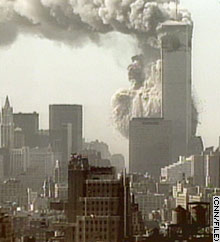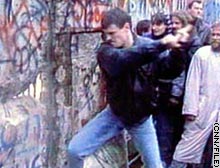|
|
||||||||||||||||||||
Some defining moments of CNN's first 25 years

One of the most defining
moments from the past quarter century is the September 11, 2001, attacks. RELATED
SPECIAL REPORTYOUR E-MAIL ALERTSDEFINING MOMENTS(CNN) -- Since first signing on the air June 1, 1980, CNN has reported on an ever-changing world, shaped by events of great tragedy and triumph. To mark the quarter-century anniversary, CNN looks at some of the moments and people that define history over the past 25 years. One of the first milestones of the 21st century began as a sunny day. But September 11, 2001, ended with the deaths of more than 2,700 people in the worst terrorist attack in U.S. history. Four planes hijacked by terrorists crashed into the World Trade Center, the Pentagon and a field in Pennsylvania in a plot officials say was organized by al Qaeda leader Osama bin Laden. (Reader's poll: Weigh in on the top stories) Over the course of the day and weeks to come, the world followed the developments and investigation, as well as heartbreak, as personal accounts emerged from the national tragedy. "What happened to our nation on a September day set in motion the first great struggle of a new century," President Bush said at a memorial service in Washington, a year after the attacks. Six years earlier, the world had learned of another building severely damaged and lives lost after a deadly bomb ripped through the Alfred P. Murrah Federal Building in downtown Oklahoma City, Oklahoma. Decorated Gulf War veteran Timothy McVeigh was convicted of planning the attack and detonating the bomb, and was executed in June 2001. McVeigh's ex-Army buddy, Terry Nichols, is serving multiple life sentences on federal and state charges for assisting in the crime, and a third man, Michael Fortier, was sentenced to 12 years in prison for not warning authorities about the plot. Federal prosecutors theorized that the Oklahoma City attack was motivated by antigovernment feelings over the raid on the Branch Davidian compound outside Waco, Texas, in 1993. The government believed that the religious group, headed by David Koresh, had stockpiled weapons. A 51-day standoff ended when the FBI stormed the compound, and a group of buildings caught fire and burned to the ground, killing some 80 inside. Haunting stories about ethnic rivalries that exploded into atrocities came out of Rwanda and the Bosnian war. In three months of brutal and unrestrained violence in 1994, nearly 1 million people were killed in Rwanda when ethnic Hutus tried to exterminate moderate Hutus and Tutsis. "The genocide was brutal, criminal and disgusting and continued for 100 days under the eyes of the international community," Canadian Gen. Romeo Dallaire told a conference marking the 10th anniversary of the slaughter. Dallaire was commander of a small U.N. peacekeeping force in the African nation when the genocide began. Full-scale civil war broke out in Bosnia and Herzegovina in 1992 between Serbs, Croats and Muslims. As part of an ethnic cleansing policy by the Serbs, thousands of Muslims were forced from towns and killed or placed in concentration camps. In Srebrenica, some 8,000 Muslims were believed killed in a massacre, considered the worst in Europe since World War II. Nature delivered destruction in the form of the 2004 tsunami. The world's most powerful earthquake in more than 40 years struck deep under the Indian Ocean on December 26, triggering massive tsunamis that obliterated cities, seaside communities and holiday resorts, killing tens of thousands of people in a dozen countries. Another earthquake that struck in 1989 is one remembered by many -- because they watched it live on TV. Just moments before a World Series baseball game in San Francisco -- with millions tuned in -- the quake hit the Bay area, killing more than 60 people. Three years later, rioting erupted in Los Angeles after a majority white jury acquitted four police officers of the videotaped beating of black motorist Rodney King. The riots left 55 dead, thousands injured, a billion dollars in damage, and a wall of distrust between the police and the black community. The world mournsSome events from the past 25 years brought the world together in mourning. On April 20, 1999, Columbine High School in Littleton, Colorado, became infamous when Eric Harris and Dylan Klebold opened fire on fellow students and faculty. By the end of the day, 14 students, including the shooters, and one teacher were dead. Millions of TV viewers watched the aftermath and witnessed the dramatic images of Pat Ireland, then a 17-year-old junior, hanging out of a second-floor window to escape. "I think initially there was some question as to why, but you just can't focus on that stuff," he told CNN in 2005. "You've got to get past it and realize that you have your own life to live and try to make the most of it." Two painful moments from the past quarter-century reminded us of the vulnerabilities of space flight: the space shuttle Challenger and Columbia tragedies. Carrying seven crew members, including high school teacher Christa McAuliffe, Challenger lifts off January 28, 1986, and explodes 74 seconds later. Seventeen years later, on February 1, 2003, it was a shuttle landing that turned tragic. About 15 minutes before its scheduled touch down at Kennedy Space Center in Florida, Columbia disintegrates in the atmosphere 40 miles above the Earth. Once again, all crew members are lost. Accidents in the 1990s claimed the lives of two almost fairy-tale figures who were beloved by millions. Britain's Princess Diana, the "people's princess," was killed in a car accident in Paris in 1997, along with Dodi Fayed and driver Henri Paul. Two years later, John F. Kennedy Jr., who had spent his life in the spotlight as a member of America's "royal family," died in a plane crash with his wife and her sister. Moments of triumphAlong with the stories of sorrow, the past 25 years also has seen moments that gripped the heart of viewers. Trapped in a cramped, flooded chamber deep below the Pennsylvania countryside, nine miners fought to survive for more than three days in 2002. Above ground, a community rallied to their aid, despite a mountain of obstacles, and a nation followed the suspense. 
In 1989, crowds destroyed
the Berlin Wall, signalling the collapse of East Germany's Communist
regime. One by one, all nine soggy and exhausted Quecreek miners, their faces blackened with coal dust, were pulled from the cold and dark hole, met by applause and cheers. Fifteen years earlier, an infant known as "Baby Jessica" to the world was the subject of another successful rescue. For 58 hours, crews in Midland, Texas, worked feverishly to rescue 18-month-old Jessica McClure from an abandoned well. Eventually, paramedics were able to squeeze into a parallel passageway and slide Jessica out of the narrow shaft 22 feet below the ground and into the bright glare of television lights. Two events in 1989 showed the world the power of convictions. Pro-democracy demonstrators in China confronted tanks in Tiananmen Square, with deadly results. The same year, East Germany's Communist regime collapsed and crowds joyfully destroyed the Berlin Wall, the symbol of a Germany divided since World War II. Nelson Mandela's life has inspired many who watched him spend much of his life fighting South Africa's apartheid system. He was in prison 27 years before attaining his freedom in 1990 and then becoming his country's first black president. Inside the battlefield, courtrooms, Wall Street"Something's happening outside." With those words by CNN's Bernard Shaw from a Baghdad hotel, the world learned that the Iraq war in 1991 had begun and, for the first time, the public could experience the fighting and bombing live. Operation Desert Storm quickly drove Saddam Hussein's armies from Kuwait, which the Iraqis had invaded months before. Twelve years later, U.S. and coalition forces launched attacks against Iraq, after the Bush administration and its supporters in Congress said Saddam had kept a stockpile of chemical and biological weapons in violation of U.N. resolutions. Reporters embedded with troops gave the public unprecedented live access inside the battlefield as major fighting unfolded. In the past 25 years, viewers also have had the ability as never before to go inside the courtroom. Watching live, the public could follow the daily proceedings in the 1991 William Kennedy Smith trial and tune in as he was acquitted of rape. And in perhaps the most watched trial of the past decades, all of the world learned of O.J. Simpson's not guilty verdict by the jury at the same time as he did on October 3, 1995. The world watched on Black Monday -- October 19, 1987 -- as business markets mysteriously tumbled uncontrollably. On that day, the Dow Jones Industrial Average recorded the largest one-day decline in history. Over the next weeks, stock markets around the globe suffered. Political momentsFor most of CNN's first decade, President Reagan dominated politics, ushering in the modern-day conservative political movement with two terms in the 1980s. His death in 2004 prompted a five-day national farewell full of ceremony and somber majesty. Another president is remembered for the scandal that surrounded him. President Clinton's relationship with White House intern Monica Lewinsky shocked a nation and his 1998 impeachment trial -- in which he was found not guilty -- riveted them to their television screens. Seven years earlier, the public watched Anita Hill testify during the Senate confirmation hearing of then-Supreme Court nominee Clarence Thomas. Her sometimes graphic allegations of prior workplace sexual harassment by Thomas during their employment at the Equal Employment Opportunity Commission put a spotlight on the issue. Perhaps the biggest political firestorm ignited in the 2000 presidential election. After a historic, protracted 36-day legal battle, then-Texas Gov. George W. Bush became the winner after a Supreme Court ruling on the Florida vote favored Bush over Vice President Al Gore.
|
| |||||||||||||||||||
| © 2007 Cable News Network. A Time Warner Company. All Rights Reserved. Terms under which this service is provided to you. Read our privacy guidelines. Contact us. Site Map. |
|


